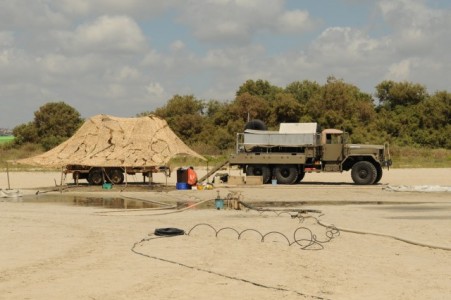Jewish People’s 3,000 Year-Old Connection to the Desert Remains Strong
According to the Passover story, after escaping slavery in Egypt, the Jewish people wandered for 40 years in the desert on the way to the promised land. Today, the Negev Desert makes up more than half of Israel’s territory. It is home to many of the IDF’s major bases, and significant training and drills take place in this special region.

Marching Through the Wilderness
IDF soldiers endure long and intense training in order to prepare them for any scenario they may face on the battlefield. For those in a combat role, a long “masa” – journey in Hebrew – marks the end of their training and the beginning of their service as IDF fighters. These marches often take place in the heat of the Negev Desert.
These extreme conditions help train the soldiers and strengthen both their bodies and their minds. The arid conditions of the desert quickly exhaust the soldiers, so they must muster all of their strength in order to complete these difficult treks.
The Natural Detectives: Desert Reconnaissance Battalion
The Desert Reconnaissance Battalion is a unique IDF unit comprised entirely of Bedouin soldiers. These fighters use their unmatched skills to track terrorists and thwart infiltration attempts into Israel. The Bedouin lifestyle and strong connection to the desert gives these soldiers a remarkable set of tracking skills, allowing them to notice even the smallest of details on the desert floor.
Years of living in sparsely populated desert areas and spending lots of time outdoors has taught the soldiers of the Desert Reconnaissance Battalion how to be desert detectives. They can spot a single footprint in the sand and learn volumes from it – who, what, where and whether it’s a security threat or not.

![]()
Surviving Unbearable Conditions
Training in the desert is no simple task. It’s hot by day and cold at night; there’s no water available and no food can be found. Therefore the IDF maintains a set of tools to help its soldiers succeed in functioning in this desolate environment.


Soldiers serving and training in the desert receive special rations engineered for the extreme conditions of the desert. The food is packaged in a flexible packet which is perfect for the field. The rations don’t need to be refrigerated for two years and come in a gourmet selection of potatoes and goulash, rice and chicken legs, meatballs in tomato sauce, and several more. In order to heat his meal, all the soldiers need to do is add water, seal the bag and within minutes, thanks to a chemical reaction, the food is hot and ready to be eaten.
Water is also a serious concern for soldiers in the Negev. There is an entire unit in the IDF dedicated to providing water to forces located in extreme environments or battle zones. The water unit, comprised of IDF reservists who are experts in the field of water engineering, has advanced technologies for producing fresh water. For example, the unit has a special system which utilizes reverse osmosis to create fresh water from streams and ponds.


Comprising almost 60% of Israeli territory, the desert is an important part of Israeli life. The IDF works extensively in the desert and therefore its soldiers must be prepared for the extreme conditions they will face. Overall, the Jewish people’s connection runs deep with the arid wilderness and the IDF continues this tradition with extensive activities in the modern-day Negev.

